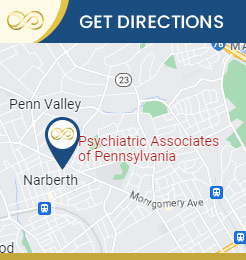Psychoeducational Assessment And Testing in Narberth, Philadelphia PA
Psychoeducational Assessments And Testing in Narberth, PA
If your child is struggling in school or displaying potential symptoms of a mental health condition, a psychoeducational assessment can help detect problems. At Psychiatric Associates of Pennsylvania, Dr. Elena del Busto and her professional team offer psychoeducational testing and therapy to identify attentional issues. Tests of intelligence (IQ), reading, writing, numeracy, and attention are all included in the psychoeducational evaluation. For more information, contact us or schedule an appointment online today. We are conveniently located on the Main Line of Philadelphia at 822 Montgomery Ave Suite 208, Narberth, PA 19072. We serve patients from Narberth PA, Philadelphia PA, Media PA, King of Prussia PA, Newtown Square PA, Wayne PA, Malvern PA, Plymouth Meeting PA, Ardmore PA, Villanova PA, Abington PA, and surrounding areas.


Table of Contents:
What is a psychoeducational assessment?
How to Get a Psychoeducational Assessment?
What is the difference between psychological assessment and psychoeducational assessment?
How long does a psychoeducational assessment take?
Psychoeducational evaluations determine whether your child has a learning disability or other issues that affect his or her ability to learn. An assessment of a child’s cognitive abilities (i.e. intellectual abilities), academic achievement levels, and information processing abilities are conducted.
Usually, psychoeducational evaluations are performed by school psychologists or other learning specialists who have previously worked in schools. In addition to formal assessments of a child’s intelligence, these evaluations usually include measures of academic achievement. Based on psychoeducational assessments, classroom accommodations, and supports are developed from an educational perspective based on the child’s learning style.
A psychoeducational evaluation is generally not as comprehensive as a psychological evaluation and usually does not assess specific cognitive functions (attention, memory, executive function, language, etc.). It may not be possible to assess, diagnose, and recommend treatment for disabilities involving language, attention, executive functioning, or other complex social/emotional and learning-related difficulties through Psychoeducational Evaluations because they are more limited in scope. Focus is more on identifying a child’s classroom difficulties (i.e. what is happening) than investigating the underlying brain origins and neurocognitive processes that may be causing the difficulties (i.e. why it is happening).
If your child is struggling in school, you should request a special interview time with his/her teacher to discuss your child’s progress in detail. There may be valuable insights into your child’s learning needs and strengths in his/her teacher. It is also possible for you to share with the teacher your understanding of your child and his/her needs. To help your child stay on top of schoolwork, your child may need remedial help, an adapted regular class program, or some extra help at home.
When additional help does not improve your child’s achievement, it may be time to pursue a psychoeducational (psychological) evaluation. Psychologists and psychological associates in private practice can conduct psychological assessments on behalf of school boards or through the department of psychological services.
Some schools use community psychologists on a contract basis because they do not have their own psychology staff. Parents in Narberth, PA, can schedule a psychoeducational assessment at Psychiatric Associates of Pennsylvania.
Psychologists perform psychological evaluations in hospitals or private practices outside of schools. Psychological evaluations assess a person’s psychological, emotional, and behavioral functioning in the same way as psychoeducational evaluations. A psychological evaluation, however, is usually intended to guide diagnosis and treatment from a medical perspective, not from an educational perspective. Due to their lack of educational background, clinical psychologists may not be familiar with schools or the specific accommodations and services that support students with disabilities.
Standardized assessments and rating scales are used in each of these evaluations. A typical assessment also involves observing the child and interviewing the parent, child, and sometimes the child’s teacher. There are some evaluators who are certified in multiple fields, such as School Psychology and Neuropsychology.
It is important to have a person with a background working in schools evaluate a child when a parent seeks guidance in developing an appropriate IEP or 504 Plan for his/her child.
The child should be observed in the school setting by someone who will also receive input from the child’s family and school personnel, who will review the child’s academic and medical history in detail, as well as conduct a comprehensive assessment of all the child’s needs.
Typically, a comprehensive psychoeducational assessment takes approximately seven hours to complete. In the event that additional testing is required, or it is difficult for your child to complete the assessment within one day, we will reschedule the appointment.
Psychoeducational assessments are available at Psychiatric Associates of Pennsylvania. To learn more, contact us or schedule an appointment online. We are located at 822 Montgomery Ave Suite 208, Narberth, PA 19072. We serve patients from Narberth PA, Philadelphia PA, Media PA, Plymouth Meeting PA, Wayne PA, Newtown Square PA, Ardmore PA, Villanova PA, Malvern PA, King of Prussia PA, Abington PA, and surrounding areas.
Does your child learn differently than others? Does your child struggle academically or socially? Do you want to know how to best tailor your child’s academics to address their strengths and weaknesses? Do you feel your child is gifted, or have you been curious about their IQ? Formal psychological evaluations can help.
How we learn and process information plays a huge role in how we interact with the world around us. Childhood is a time of tremendous growth and development; a time when children must not only learn academics such as English and math, but also about relationships and emotions and the complicated nuances that make up Life. Understanding how your child learns can play an important role in their growth and development. Typically, schools are set up to cater to the more common learning styles leaving kids with other learning styles frustrated, sad, and/or upset. It is not uncommon for these kids to feel left out or “different.” While some learning differences might be easy to identify, others require detailed testing to fully assess an individual’s strengths and weaknesses. This information is often vital to help parents and schools support children as best possible. Psychiatric Associates of Pennsylvania offers a variety of educational assessments and testing for children and adolescents.
Psychoeducational Assessments
Evaluations focus on cognitive, academic, social, behavioral, and emotional factors to investigate strengths and weaknesses, to better understand why the child or adolescent is experiencing challenges. We will also provide recommendations to address relevant concerns. Evaluations can determine the presence of learning disabilities, Attention Deficit / Hyperactivity Disorder (ADHD), problems with executive functioning, developmental problems, memory problems, language disorders, social issues, autism spectrum disorders, and other issues.”
At the start of each evaluation, we will meet with the family for an initial consultation to better understand the questions and reasons for seeking an evaluation. The assessment is then personalized based on their individual needs. A comprehensive psycho-educational assessment is then completed which typically includes a diagnostic interview, cognitive and academic testing with the child or adolescent, memory testing, executive functioning testing, or language testing when indicated, parent and teacher questionnaires, a thorough review of records including any prior testing and IEPs and a parent feedback session. Following the evaluation, we will meet with the family to discuss the findings and recommendations, and a written report is provided.
Other Testing Available
- IQ Testing
- Gifted Evaluations for School Placement
- School Admission Testing
- Autism Spectrum Disorder Evaluations


Additional Conditions We Treat
▸ Life Transitions
▸ Depression & Other Mood Disorders
▸ Anxiety Disorders
▸ PTSD & Other Trauma Related Disorders
▸ Obsessive Compulsive Disorders
▸ Attention Deficit and Hyperactivity Disorder (ADHD)
▸ Bipolar Disorders
▸ Eating Disorders
▸ Autism Spectrum Disorders
▸ Psychotic Disorders
▸ Sleep Disorders
▸ Phobia Experts
▸ Gender Dysphoria
▸ LGBTQIA+ Affirmative Therapy
▸ Men’s Mental Health
▸ Women’s Issues
▸ End of Life Mental Health
Additional Services You May Need
▸ Psychiatry and Medication Management
▸ Child and Adolescent Psychiatry
▸ Therapy and Counseling
▸ Treatment Resistant Depression
▸ Treatment Resistant OCD
▸ Smoking Cessation
▸ Transcranial Magnetic Stimulation (TMS)
▸ Psychoeducational Assessments
▸ Eating Disorders Program
▸ Neurofeedback
▸ Neurotechnology
▸ Virtual Reality Exposure Therapy
▸ Genetic Counseling
▸ Preventative Mental Health
▸ Forensic Psychiatry
▸ Anger Management
▸ Cognitive Behavioral Therapy
▸ Couples Counseling
▸ EMDR
▸ Family Therapists
▸ Grief Counselors
▸ Mindfulness and Meditation
▸ Palliative Psychology
▸ Internal Family Systems
▸ Parenting Coach
▸ Executive Mental Health


